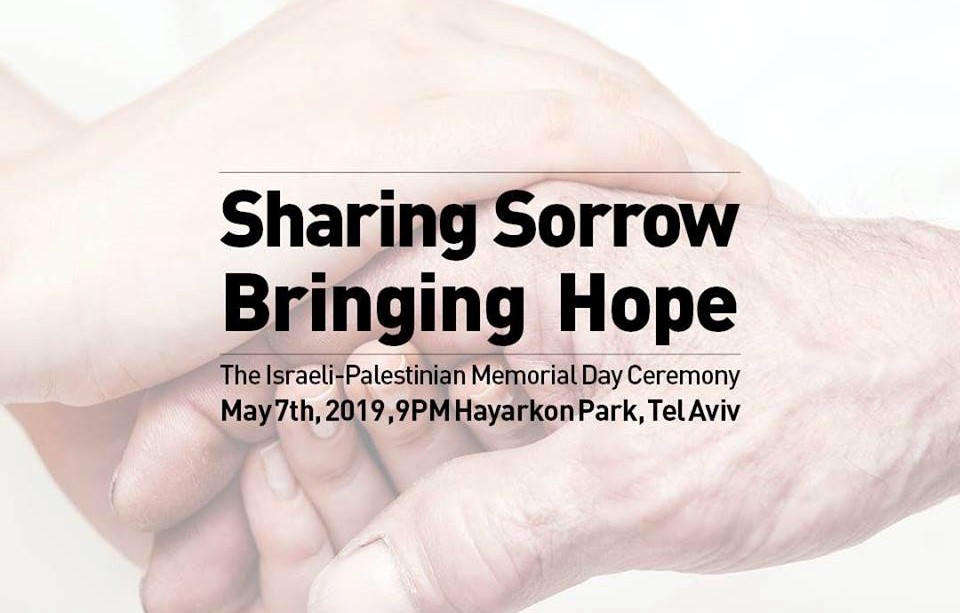Far-right Israeli Prime Minister and Defense Minister, Benjamin Netanyahu, has refused to allow Palestinians to enter Israel for an annual joint Israeli-Palestinian memorial service in Tel Aviv, scheduled for next Tuesday evening, May 7, Israel’s official Memorial Day.
Since 2006, the joint ceremony organized by Combatants for Peace and The Parents Circle – Families Forum (PCFF), has brought together bereaved families from both sides of the conflict. It is pitched as a pro-coexistence alternative to Israel’s official Memorial Day events.
Last year, then-defense minister Avigdor Lieberman similarly sought to block 110 occupied West Bank Palestinians from attending the ceremony — despite the Defense Ministry’s Coordinator of Government Activities in the Territories telling him that the Palestinians who were invited posed no security threat and recommending that he grant them entry. Lieberman said the ceremony was “a demonstration of bad taste and insensitivity that hurts the bereaved families who are most precious to us.”
However, the High Court overturned Lieberman’s ruling, saying his decision to ban the Palestinian participants was “unreasonable and imbalanced.” The ceremony eventually took place as planned. After Lieberman resigned from his position late last year, Netanyahu appointed himself defense minister as well.
On Wednesday, May 1, organizers said of the Netanyahu’s decision: “How predictable and yet regrettable that in the Defense Ministry lessons have not been learned from recent years, including the High Court decision from last year that reprimanded the defense minister for preventing the entry of our Palestinian partners.” They said those denied entry were “members of bereaved families who elected to put aside any desire for violence, terror and revenge and work with us shoulder to shoulder for dialog and reconciliation.” They accused the ministry of “acting with disdain toward those bereaved families who wish to commemorate their loved ones in a joint format that offers optimism and a joint future.”
Last year’s event was held at Tel Aviv’s HaYarkon Park with nearly 8,000 Israelis joining the bereaved Israeli and Palestinian families. Among those who addressed the 2018 ceremony was author David Grossman, whose son was killed in the Second Lebanon War, and Dr. Amal Abu Sa’ad, whose husband Yaqoub Mousa Abu al-Qia’an was shot dead by Israeli police in the Negev Bedouin village of Umm al-Hiran a year earlier.
According to an Haaretz editorial published yesterday (Friday) “The very idea that Palestinian peace activists have to ask for the occupier’s permission to enter Israel for a memorial rally is outrageous, but everyone has become used to it and sees as normal. Nothing is normal about occupation, but sometimes it spills over into especially deranged realms. For example, when the state prevents Palestinian peace activists from taking part in a memorial rally for its own fallen soldiers, on Israel’s Memorial Day.”
Another alternative Memorial Day ceremony to be held in Haifa and scheduled for the same date and time, is being sponsored by Combatants for Peace, The Parents Circle – Families Forum, Hadash and the Emil Touma Institute for Palestinian and Israeli Studies. In this case, the Defense Ministry has no prerogative of banning entry to Palestinians, at least not in the case of those Palestinians who will be attending the ceremony and who are citizens of Israel.
In addition, the Yesh Gvul movement will be holding its 22nd annual alternative torch-lighting ceremony on Independence Day, Wednesday evening, May 8. Hundreds will gather in front of the Prime Minister’s Office in Jerusalem to honor prominent individuals who “dedicate their time and energy to lighting up the dark corners of Israeli society and politics, today and always.”
Founded in 1982 in the shadow of the First Lebanon War, Yesh Gvul attempts to provide support to conscientious objectors and “refuseniks”: Israelis who object to all or some forms of service in the country’s military due to the occupation of the Palestinian territories. Last year, among the 12 who lit torches were asylum-seekers from Darfur and Eritrea, Hagit Sigawi, who is a leader in the campaign for more public housing, and human rights activist Buma Inbar, a bereaved father who works toward coexistence and reconciliation with Palestinians.
Related:
- Despite Right-Wing Protests: Israeli-Palestinian Memorial Day Ceremony Marks 10th Anniversary
- Thousands of Israelis, Palestinians Participate in Alternative, Joint Memorial Day Ceremony in T-A
- 12th Israeli-Palestinian Memorial Day Ceremony to be held in T-A
- 110 Palestinians to Be Barred from Alternative Memorial Day Event
- Thousands of Israelis, Palestinians Mark Memorial Day Together



